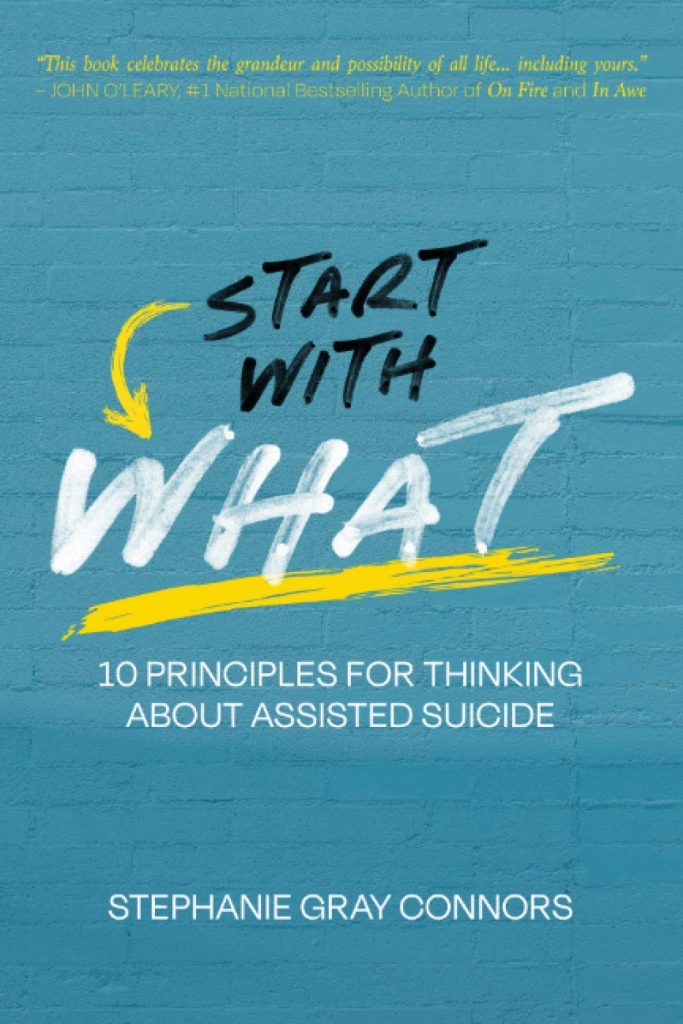
by Bonnie Finnerty, Education Director
While pro-lifers may be adept at debating the abortion issue, some may feel less confident arguing against another threat to life: assisted suicide. That is why Stephanie Gray Connors’ latest offering is a treasure that all of us should delve into.
Start with What: 10 Principles for Thinking About Assisted Suicide is relatively short but highly engaging. Those who know the author from her previous book, Love Unleashes Life, or her many debates with pro-abortion advocates, or her famous talk at Google, will rediscover in this book her gifts of clear thinking and illuminating storytelling. Those reading her for the first time will find a fresh yet experienced pro-life voice. Although dealing with the heavy topics of suffering and death, Gray Connors adroitly leaves the reader feeling uplifted by showcasing the strength of the human spirit.
The title of the book comes from the very first principle offered: when bad things happen, such as illness, an accident, or any event that causes suffering, we should not ask “Why?” but rather “What?” What can I do in light of this situation? What good can be brought out of it? When we change the question, we change our perspective, and discover possibilities to grow and to love in ways previously unknown.
Gray Connors says that if a loved one desires assisted suicide, those around him should not act on that disordered wish, but instead help the person discover their “What?”
“Perhaps their what is to empathize with another suffering soul, to become a writer, to be a listener, to teach people to how to slow down and enter into the present moment, to become an advocate for finding a cure for a disease…their what could simply be to teach others, by their need and total dependence, the life-changing power of vulnerability and love.”
Another principle Gray Connors offers is that we should strive to alleviate suffering without eliminating the sufferer. While putting down a sick pet can be regarded as a merciful act, “putting down” a human is not the same. We possess an inherent dignity that animals do not, and ending human life prematurely as a response to suffering is not only wrong, it puts us on a very slippery slope as to whose life is worth living.
The truly merciful choice is to seek palliative care, assessing and treating the pain that a person faces when encountering a life-threatening illness. Such pain management allows people to live fully and comfortably until the natural end of their lives. Gray Connors reminds us that those last weeks, days, and hours leading up to death provide conversations and opportunities between loved ones that are priceless. Assisted suicide stunts all of that.
A third principle to consider is that suffering unleashes love. Suffering elicits a response in others and within ourselves, changing the way we relate, altering the way we live. Through several heartening real-life stories, the author highlights the human flourishing that arises from difficult, often tragic, circumstances. While none of us desire suffering, she acknowledges the transformative power it can have.
“Suffering is part of the human experience. It cannot be avoided. But it can be shared. And it is when we share it, when we enter into it, when we wrestle and do battle with it, when we respond to it with creativity, it is then we begin to discover the power of suffering not just in the crushing but also in the re-building, the drawing-in, and the uniting.”
Through several additional principles, Gray Connors conveys even more wisdom. In many ways, Start with What is as much about intentional, purposeful living as much as anything else. Anyone who is alive, anyone who suffers, or anyone who will someday die should read it and ponder the truths within. If they do, they will be much more equipped to not just effectively make the case for life, but to find their own “what?” when faced with hardship.
